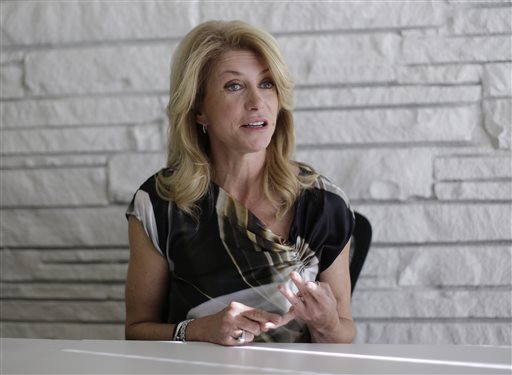“Where were you born?” Every few months, I sit across the table from a new client and a recording device. “Let’s start from the beginning,” I say, after pouring a cup of coffee and settling in to hear their story.
Videos By Rare
I’m a “ghostwriter,” or — as some prefer — a “celebrity collaborator.” That means I listen to the details of people’s lives and help form them into narrative, book form.
Over the course of my occupation so far, I’ve traveled over 12,000 miles and conducted interviews on a presidential campaign bus; in an Olympic training center; in a Tex-Mex restaurant; and in a nail salon. Regardless of location, however, every book begins with questions designed to get to the heart of each person’s story.
Lately, I’ve wondered what it would be like to sit across from Wendy Davis.
Davis, as you may remember, is the Texas state senator who filibustered for abortion rights, which instantly catapulted her into the Democratic stratosphere. She’s attempting to parlay her newfound fame into being her state’s first Democrat governor in almost 25 years. Her story of adversity, strife and hard work has been a cornerstone of her campaign and fundraising.
Davis, we were told, was a divorced teen mother who worked her way from a trailer to Harvard through true grit and independence. What she claimed to be a “real Texas success story,” however, has turned out to be a bit more nuanced. Some of the details were wrong.
Davis divorced when she was 21, not 19 as she has claimed. She did live in a mobile home — her parents’ — but it was only for a few months until she found an apartment. Then she married a lawyer who was 13 years her senior. He paid for her last couple of years of college and her years at Harvard Law School. She divorced him the day after he paid the last bill. During the divorce, he accused her of adultery and received custody of their two children. Her husband said she claimed she said she “didn’t have time for children.”
Of course, she’s not alone in misrepresenting her story. Barack Obama’s memoir has many claims that turned out to be distortions, according to Pulitzer Prize–winning journalist David Maraniss, including:
• His claim that his grandfather — a cook in the British Army — was detained by the British in Kenya and tortured.
• The story of his dad’s stepfather being killed by Dutch soldiers as he fought for Indonesian independence.
• Obama’s claim that his father abandoned him when he was 2 years old.
• His complaint that upperclass Hawaiian girls wouldn’t date him.
Plus, a character called “Ray” who was symbol of “young blackness,” was actually half Japanese, part native American and part black. In fact, he wasn’t even a close friend.
If we’re honest, many of us tell stories in ways that enhance our own reputations.
So, why is it so hard to tell one’s own story honestly? Three reasons:
1. Stories are powerful ways to connect with our support system.
The producers of American Idol, the Olympics, and presidential campaigns know that “backstory” is one of the most important ways to connect with viewers and voters. Obama did a great job of creating an inspirational, albeit somewhat fictionalized, narrative voters loved. By comparison, GOP contender Mitt Romney never told his story in a compelling way, focusing instead on his core fiscal competency. Well, that didn’t capture the voters’ imaginations. (Recently, when independent filmmaker Greg Whiteley debuted the behind-the-scenes movie, “Mitt,” at Sundance, some moviegoers lamented they hadn’t supported him when they had the chance. “We didn’t feel like we ‘knew’ him until now,” they said. Because there is such latent power residing in our narratives, it’s hard to resist the urge to make ourselves as compelling as possible. This, sadly, leads me to my second point.
2. We want to be better than we are.
In “Dreams of My Father,” Obama described his own grandfather as creating “history to conform with the image he wished for himself.” This may have been the most truthful statement in his book: We all want to establish ourselves as more virtuous, kind and resourceful than we are. Davis’s story, for example, was good enough without adding self-glorifying enhancements. The tweaks changed her into a strong independent woman when she was probably much closer to being a calculating opportunist.
3. We don’t realize our stories are merely subsets in a much greater narrative.
As a mother, I find myself saying, “You aren’t the center of the universe.” Well, we adults need to be reminded of this from time to time: The world doesn’t revolve around us, either. Our stories — as significant as they seem to us in the moment — are mere subsets of the grand story which has been unfolding since before the beginning of time. “The triune God is the protagonist of this cosmic drama,” writes Associate Professor of Biblical Theology at Southern Seminary James M. Hamilton Jr. The central focus of creation — of which we’re a part — is God’s glory. That means we’re necessarily limited to supporting cast because God’s story is bigger than our stories.
We frequently spin our own stories because we lack contentment over how our lives have played out — even the Harvard Law grads. Even presidents.
In the scriptures, however, God is described as “the author and finisher of our faith.” What Wendy Davis, Barack Obama and all of us need to realize is that we certainly don’t need to edit his work.

